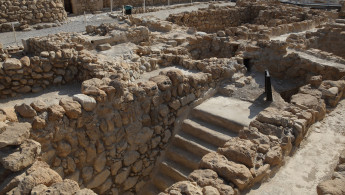Ancient Hebrew document found in Cairo shines light on Dead Sea Scrolls secret
A thousand-year-old Hebrew document found in Cairo may reveal a secret from the Dead Sea Scrolls, according to new research.
The document could unveil a mystery, which has confused scholars for centuries, as to why over 15,000 pieces of over 900 original documents and fragments of the scrolls were hidden in caves around the archeological site of Qumran in the occupied West Bank, reported Live Science.
The evidence suggests Qumran may have been where large annual ceremonies were held for the Jewish sect, the Essenes.
It is believed that Essenes gathered at Qumran from around Palestine to partake in a ritual known as the 'Covenant of Renewal'.
"The countrywide gathering in Sivan [the third month of the Jewish calendar] was a large and well-regulated event for which clear and detailed rules were established," Daniel Vainstub, an archaeologist at Ben-Gurion University of the Negev, told Live Science.
This research also led Vainstub to the theory that many of the Dead Sea Scrolls could have been written by the Essene communities in the region, but were brought to Qumran during their annual festival.
The document found was from the Damascus Covenant, an important document from the Essene community, which was copied from a Hebrew source around the 10th century AD and stored in the Cairo Genizah, a storeroom, alongside over 400,000 Jewish manuscripts.
Versions of the Damascus Covenant were found in the Genizah, while fragments of the document were discovered among the Dead Sea Scrolls.
The document notes a version of rules from the religious community, as fragments of the Dead Sea Scrolls also refer to a festival that matches the description of the gathering.
Vainstub states that the version from Genizah has a more complete description of a ceremony mentioned in the Dead Sea Scroll fragments, that had not been previously understood until now.
"I argue that the Damascus Document contains the bylaw or rule that regulates the annual gathering... no one noticed this before me," Vainstub said.





 Follow the Middle East's top stories in English at The New Arab on Google News
Follow the Middle East's top stories in English at The New Arab on Google News
![The UAE is widely suspected of arming the RSF militia [Getty]](/sites/default/files/styles/image_330x185/public/2024-11/GettyImages-472529908.jpg?h=69f2b9d0&itok=Yauw3YTG)
![Netanyahu furiously denounced the ICC [Getty]](/sites/default/files/styles/image_330x185/public/2024-11/GettyImages-2169352575.jpg?h=199d8c1f&itok=-vRiruf5)
![Both Hamas and the Palestinian Authority welcomed the ICC arrest warrants [Getty]](/sites/default/files/styles/image_330x185/public/2024-11/GettyImages-2178351173.jpg?h=199d8c1f&itok=TV858iVg)